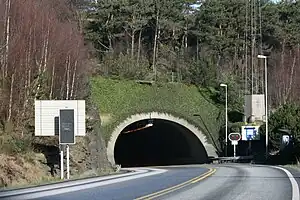 View of the entrance to the tunnel | |
| Overview | |
|---|---|
| Location | Rogaland, Norway |
| Coordinates | 59°02′24″N 5°38′00″E / 59.0401°N 5.6332°E |
| Status | In use |
| Route | |
| Start | Randaberg |
| End | Sokn |
| Operation | |
| Opened | 1992 |
| Operator | Statens vegvesen |
| Toll | Until 2006 |
| Vehicles per day | 9717 (2018) |
| Technical | |
| Length | 5,875 m (3.7 mi) |
| No. of lanes | 2 |
| Lowest elevation | −223 m (−732 ft) |
| Grade | 8% |
The Byfjord Tunnel (Norwegian: Byfjordtunnelen) is a subsea road tunnel in Rogaland county, Norway. The 5,875-metre-long (19,275 ft) tunnel runs between the village of Grødem on the mainland in Randaberg municipality and the island of Sokn in Stavanger municipality, running underneath the Byfjorden. The tunnel was built as part of the Rennesøy Fixed Link project which opened in 1992 with the goal of connecting all the islands of Rennesøy to the mainland. The tunnel was a toll road from 1992 until 2006. The tunnel is part of European route E39 highway. With a maximum 8% grade, the tunnel reaches a depth of 223 metres (732 ft) below sea level at its lowest point. The tunnel was Europe's longest and the world's deepest tunnel upon its completion, it was surpassed by a deeper tunnel in 1994 and a longer tunnel in 1999.[1][2] The tunnel had an average daily traffic of 9,717 vehicles in 2018.[3]
References
- ↑ Norwegian Public Roads Administration (2004). "Beregning av gjenanskaffelsesverdien av riksvegnettet" (PDF) (in Norwegian). Archived from the original (PDF) on 6 October 2012. Retrieved 6 January 2011.
- ↑ Store norske leksikon. "Byfjordtunnelen" (in Norwegian). Retrieved 2015-12-18.
- ↑ "Trafikkregistreringer - Rogaland - E39 Sokn". Statens vegvesen (in Norwegian Bokmål). Retrieved 2019-03-10.